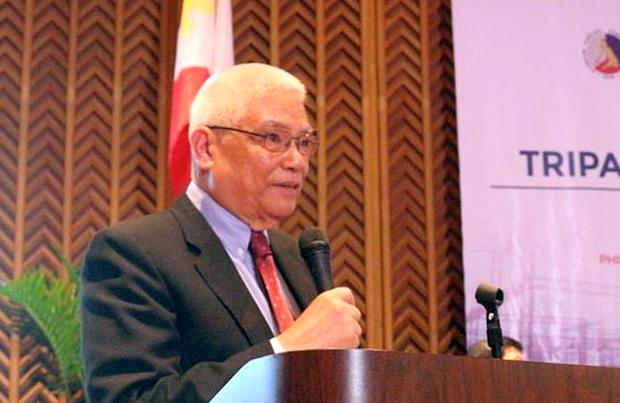DICT chief threatens to resign over 3rd telco roadblocks

DICT acting Secretary Eliseo Rio Jr. speaks at the PICC on June 8, 2018, at the signing of the Tripartite Agreement for the the utilization of spare optical fiber to boost the implementation of the National Broadband Plan (NBP). DICT signed the agreement with the National Grid Corporation of the Philippines (NGCP), and National Transmission Corporation (TransCo). (Photo from the Facebook page of the DICT)
The head of the Department of Information and Communications Technology (DICT), fed up with government delays in the selection of a new major telco player, has issued an ultimatum.
Eliseo Rio Jr., DICT acting secretary, threatened to resign during the next oversight committee meeting on Friday if he cannot convince most of its members to choose the DICT’s version of the draft selection rules, which have garnered strong support from interested participants and the general public.
The issue, he said, will be put to a vote.
“It’s going to be make or break by Friday. It’s so delayed already,” Rio, a former general of the Armed Forces of the Philippines, said in an interview on Sunday.
“I’m putting all my cards on the table,” he added.
Article continues after this advertisementThe release of the final terms of reference (TOR), which the government will use to determine which new telco will get a coveted set of 3G, 4G and potential 5G radio frequencies, has been delayed for months now due to deep divisions within the oversight committee that is crafting the TOR.
Article continues after this advertisementThe DICT is still targeting to name a new telco challenger within 2018.
Rio is chair of the oversight committee, whose other members include Finance secretary Carlos Dominguez III as vice-chair, Executive secretary Salvador Medialdea, and National Security Adviser Hermogenes Esperon.
Rio favors a TOR that rewards proposals based on coverage, internet speed and investment, otherwise known as the highest committed level of service (HCLoS) model.
He is at odds with Dominguez, who is pushing for an auction of the radio frequencies. The floor price was set at over P6 billion.
Rio clarified that the approval of the oversight committee was not required.
Its primary role, based on Administrative Order No. 11, which authorized the creation of the committee, was to “assist” the National Telecommunications Commission in the crafting of the TOR. The NTC is under the DICT.
“I am hoping for a consensus,” Rio said. “If I lose, then I might as well resign.”
The HCLoS model has found strong support among ICT advocates and groups vying to become the country’s so-called third telco player, since it will compete with the PLDT Inc. and Globe Telecom duopoly.
Last July 6, 11 out of 15 interested companies favored the HCLoS model while two voted in favor of an auction. Among public stakeholders that were surveyed, the HCLoS was supported by 96 percent of participants.
Foreign telcos that were said to be interested included China Telecom, South Korea’s LG LG Uplus Corp., Japan’s KDDI and Vietnam’s Viettel.
Under the HCLoS rules, the minimum annual standards were set at 30 percent in terms of national population coverage, 5 Megabits per second for internet speed and P40 billion in capital and operational expenditure per year over a five-year commitment period.
Bidders can offer better terms in each of those metrics to score more points in the selection process.
Rio earlier warned against an auction, saying this will lead to a bidding war that will burden a new player with billions of pesos in upfront costs, which will be passed on to consumers. This also goes against the objective of President Rodrigo Duterte, who wants fresh competition to lower prices and improve the quality of services.
He added it was also unfair to a new player, given that PLDT and Globe were never subjected to a spectrum auction.
In defending the auction model, Dominguez said Filipino taxpayers will be able to reap financial benefits from the government’s unassigned frequency assets.
He also wanted a new player to prove it had the financial muscle to compete with PLDT and Globe, citing cases in the past when smaller telcos were acquired by the incumbents.
Such a buyout scenario, however, is unlikely under either TOR being pushed by the DICT and DOF.
Under both sets of rules, the telco that is awarded the frequencies will be barred from merging with a dominant player, or a company with a market share of at least 40 percent. Doing so will force it to return the frequencies to the government “without condition.”
Moreover, the TORs require a new player to post hefty bonds and deposit payments.
Other issues raised by Dominguez were a legal row over a set of 3G radio frequencies, the formulation of a common tower policy, a final agreement between stakeholders of the government’s power transmission assets over its dark fiber network, and lower interconnection rates.
Rio said none of those issues have been tagged as deal-breakers during the DICT’s discussions with interested groups. He added that some of those issues have been resolved while others have a solution already in place.
“These elements can be done in parallel to the selection process,” Rio said. “Nobody else is making an issue here.” /je